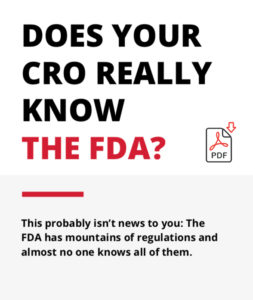How Your Partners Might Fail to Properly Understand Regulations
None of your partners are trying to make your late stage approvals process difficult. But they might be doing it anyway.

It’s not uncommon for the root of a problem to lie not with your organization, but with a partner CRO. Here are some of the most common ways partner organizations can complicate your FDA approvals process:
- Documentation: The FDA’s documentation guidelines are rigorous to say the least. Just like in 8th grade math, they want you to show your work. If you don’t, and in great detail, you can be in non-compliance. That’s going to involve a lot of backtracking to find out where everything went wrong.
- Validation: Validation is similar to documentation, but goes beyond simply checking your work. This is where the FDA looks at the drug’s class, mechanism of action and target to ensure they’re accurate. This can influence whether a lot of your other data is up to snuff for FDA approval.
- Efficacy: Remember, that you don’t just need to prove your new treatment is safe. You also have to prove that it’s effective. That’s a much higher bar. Even very small data inaccuracies regarding your product’s efficacy can mean you’ll be heading back to the drawing board and starting all over again — or close enough.
- Trial Complexity: Believe it or not, your patient pool might be too large, requiring a highly experienced team to analyze the data. This requires subsequent studies to get into the nitty gritty of data to obtain detailed information about how safe and effective your drug is.
These are just a few of the ways CROs can impact your approval process. Read our recent white paper for a detailed discussion of how to select the best CRO who is most familiar with the approvals process.
Next Steps:
Read our analysis on other topics related to Getting FDA Approval.
Schedule a one-on-one call to see how we can help with you FDA Submissions.
See how Princeton’s services can help you.
Subscribe to our blog to stay up to date.